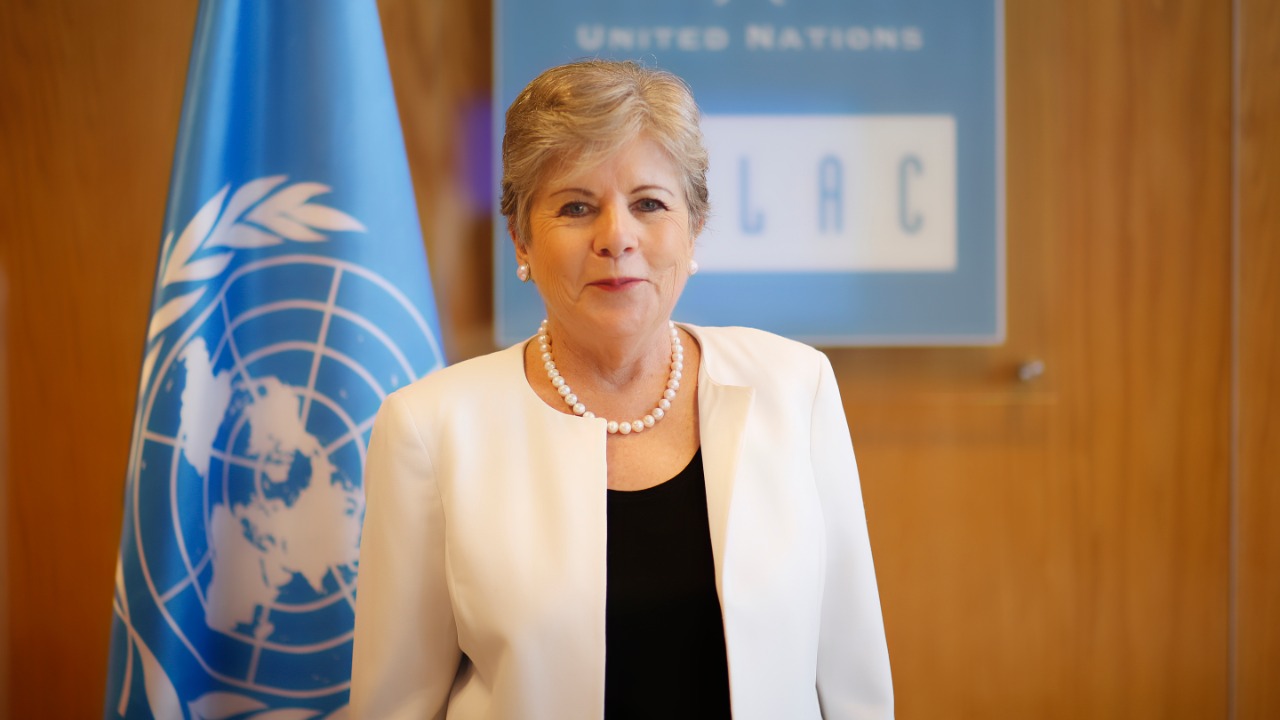Negotiations in the Framework of the WTO are a New Model of Governance for Foreign Direct Investment: Alicia Bárcena
ECLAC’s Executive Secretary was one of the main speakers at a high-level roundtable on a WTO Investment Facilitation Framework for Development for Latin American economies.

The Executive Secretary of the Economic Commission for Latin America and the Caribbean (ECLAC), Alicia Bárcena, indicated today that the negotiations on an investment facilitation for development agreement launched in the framework of the World Trade Organization (WTO) are a new model of governance for Foreign Direct Investment (FDI), since they stress cooperation between investors and host countries, in contrast to traditional agreements that put the emphasis on granting all sorts of rights to investors, without any obligations.
The senior United Nations official was one of the main speakers at the “High-level regional roundtable on the benefits and challenges of a WTO Investment Facilitation Framework for Development for Latin American economies,” organized by the International Trade Centre (ITC), ECLAC, the German Development Institute (DIE, Deutsches Institut für Entwicklungspolitik), the WTO, and the World Economic Forum (WEF).
According to Alicia Bárcena, many Latin American and Caribbean countries have already made progress on investment facilitation measures on their own, so this new agreement in the framework of the WTO represents an important step and should not be perceived as an outside imposition.
“In these difficult times, bringing multilateral cooperation back is critical, not least in trade and investment. We need new multilateral rules that put sustainable development at the forefront. The negotiations on a WTO investment facilitation framework are a great opportunity in this regard,” Bárcena indicated today during the high-level event that brought together prominent international specialists.
Other participants in the roundtable included Pamela Coke-Hamilton, Executive Director of ITC; Anna-Katharina Hornidge, Director of DIE; Børge Brende, President of the WEF; and Ngozi Okonjo-Iweala, Director-General of the WTO (by video message). Alicia Bárcena also moderated the event’s first session entitled “The WTO negotiations of an Investment Facilitation Framework for Development: What is at stake for Latin American countries,” where the speakers included Foreign Affairs Ministers and Deputy Ministers as well as ambassadors to the WTO, from Argentina, Brazil, Chile, Colombia, Costa Rica and Mexico.
In her presentation, Alicia Bárcena highlighted the negotiations on an investment facilitation for development agreement, which were launched in the framework of the WTO last September. According to the global organization, investment facilitation can be understood as the creation of a more transparent, efficient and investment-friendly business environment by making it easier for domestic and foreign investors to invest, conduct their day-to-day activities and expand their existing investments.
Bárcena explained that investment facilitation has emerged in recent years as a new approach that puts the emphasis on cooperation between foreign investors and host governments to pursue mutually beneficial outcomes. Several Latin American countries have seen the value of this new approach and become active participants in the ongoing WTO negotiations, she noted.
“These negotiations are a great opportunity to achieve greater coherence between the rules of the multilateral trading system and the Sustainable Development Goals adopted by the global community in 2015,” she stated.
ECLAC’s Executive Secretary also indicated that the COVID-19 pandemic is having a devastating effect on Latin America and the Caribbean, with a 7.1% drop in the region’s GDP in 2020, a sharp increase in poverty and inequality, and a marked deterioration among all social indicators. With just 8% of the world’s population, our region accounts for almost 30% of all deaths caused by the pandemic so far, she underlined.
“Economic recovery is of the utmost importance, but not just any recovery. We need a transformative recovery that is greener, more inclusive, and that puts the region on a sustainable development path,” Alicia Bárcena emphasized.
To achieve such a transformative recovery, we must ensure and accelerate vaccine production and distribution in the region, she said. “We cannot create islands of immunity. The pandemic is an opportunity to leverage productive and technological capacities for the development of vaccines and medicines here in Latin America and the Caribbean,” she insisted.
In this area, Alicia Bárcena stated that massive investment is needed to achieve that objective. She explained that with fiscal space as reduced as it is today (due to the costs that the pandemic has entailed for countries), Foreign Direct Investment (FDI) will play a crucial role in Latin America and the Caribbean’s recovery. However, FDI inflows into the region declined after 2013, and the pandemic worsened this scenario, prompting even steeper falls in 2020. “We need to put investment at the service of sustainable development,” she underscored.
Finally, ECLAC’s Executive Secretary called for preventing investment from contributing to a new reprimarization of the region’s economies. To that end, she emphasized that more investment is needed in green sectors such as electromobility and in technology-intensive industries such as health care, and not just in extractive activities.
Country(ies)
- Latin America and the Caribbean